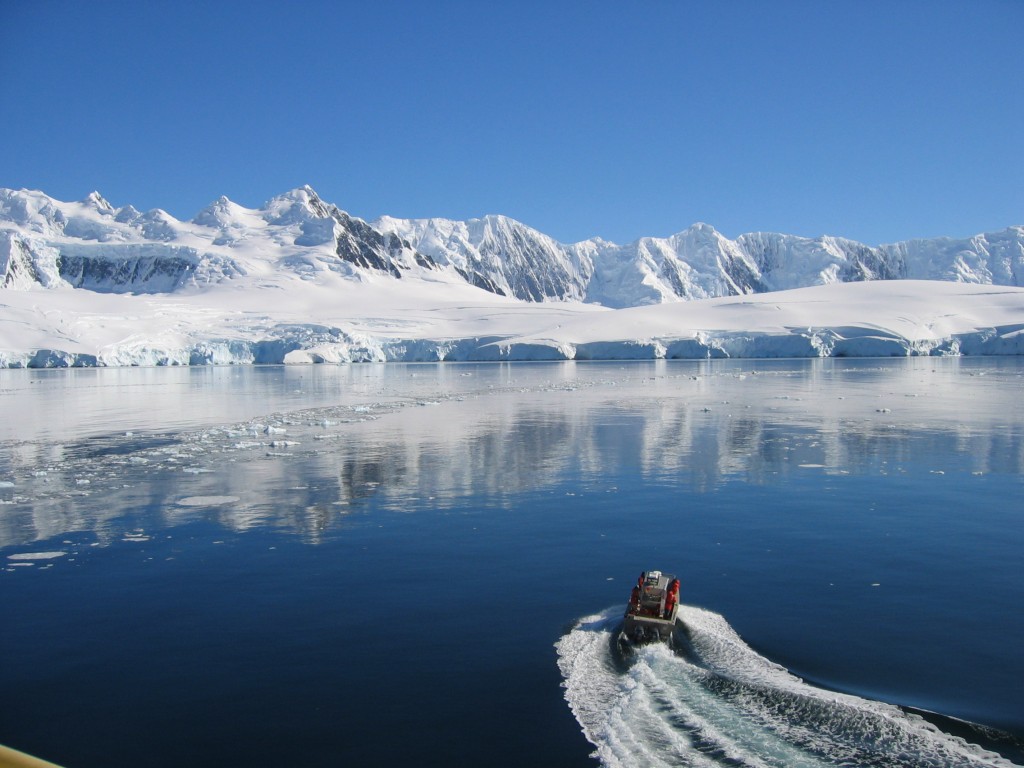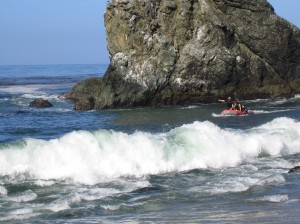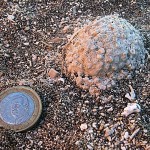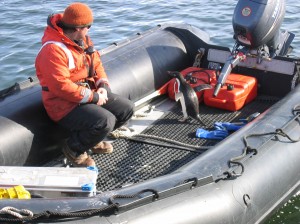
One of my favorite memories of my high-school friend Pete Dal Ferro is cruising around town with him in his red 1966 Plymouth Valiant. Fun, right? Over the years, I’ve heard bits and pieces about his adventures since—things about SCUBA diving and Antarctica and cruising around in even bigger boats than his sweet high-school ride, and I’ve always wanted to learn more.
So this post was my excuse to find out what he does and how he got there. Pete’s an engineering technician for the USGS’s Pacific Coastal and Marine Geology Team. He designs, builds and fixes scientific instruments. He sets up experiments. He’s a small-boat guru. Basically, he takes care of all the behind-the-scenes aspects of marine research so that scientists can show up and start collecting data.
A big thanks to Pete for putting up with me in high school, and for putting up with all my questions now. Anyway, here he is, telling me about his awesome job.
**
I’m the master for the 34-foot catamaran, the r/v Parke Snavely. We can haul it on a trailer, and we go up and down the coast. My favorite work right now is in Puget Sound. I didn’t know anything about Puget Sound before I got this job, and it’s a cool place. The mountains are beautiful, it’s green and lush, and the waters are all protected.
The international sailing association defines a circumnavigation of the earth as 21,600 nautical miles or more. We’re fond of telling people we’re on our second lap with this boat. Mostly, it’s from going back and forth. When you’re mapping, it’s like mowing the lawn. The sonar reaches out a certain distance on either side of the boat. You take info from the first stripe, and match it up to the second stripe, and so on, to get a map.
I hold the hand of scientists out in the field so they don’t freeze to death, or get into some kind of trouble. We are the roadies of science. Picture Mick Jagger without the guy who handed him the guitar. The scientists have to think, and we do all the other stuff.
I knew after Mr. Goodheart’s marine biology class in high school that I wanted to do marine biology. So I went to UC Santa Cruz. My third year, I took a research diving class on Catalina Island. Then I took whatever upper-division classes that let me dive. Like Kelp Forest Ecology, where each week you have an hour-long class and then two six-hour labs diving in Monterey Bay.
Meanwhile I’d gotten a student employee job at the Long Marine Lab, thinking all along I was going to go to grad school. Then I met a bunch of grad students and saw what that life was like. You get narrower and narrower as you get farther—you know, those people know about all about the gill structure of limpets. But I didn’t want to do that. The fun part about science is going out in the field.
I was a muck-slinger at the lab. I forklifted stuff around. Then right when I graduated, the guy who was the assistant dive officer went to Antarctica, and I got his job. I got the job way greener than I was entitled to. And I did that for 11 years, and it was sweet.
I went with one scientist down to Baja–he was surveying giant kelp, which lives from just north of the San Francisco Bay to partway down the Pacific coast of Baja. We’re pulling the boat on a trailer down some beater-ass road to a surf spot he heard of once to find kelp beds.
I also went to the Sea of Cortez with a woman studying rhodoliths. You know, when you see all that pink and purple stuff on the rocks. It’s coralline algae, and it forms these things on the rock that look like clumps of lace. Imagine a zillion golf balls in a pile. They’ve got holes around them, and things live inside of the hole. It’s a nursery for different species, in the same way that estuaries and seagrass beds are. So we went down there and camped on the beach, and humpback whales were jumping right off our research site.

People always ask me how I learned to do some of this stuff. I didn’t know how to drive a boat in high school. It sounds glamorous, boat driving.
You learn as you go. I read a lot of technical manuals about the compressor because it broke. Any of the shit I did on the ship’s back deck, it’s on-the-job training. I learned how to drive boats at the university because they needed someone to drive boats.
With the university, I spent the summer working 60- and 70-hour weeks. Then in the winter, I was going to Antarctica for Raytheon, which had a contract with the National Science Foundation U.S. Antarctic program.
I worked on two research vessels—one proper icebreaker, one science vessel. We mostly went back and forth between Chile and Antarctica, or back and forth to New Zealand. There were a couple of techs on each trip. If a scientist wanted to do cores, we’d get everything ready. If they were studying plankton, we’d set up the plankton tows and get plankton from whatever depth they wanted.
I don’t have the time to do Antarctica anymore since I started the USGS job. We do the same kind of work, though, so I’ve been to the Arctic twice–on a different ship, wearing a different logo shirt.
My favorite Antarctica trip? I worked on a Long Term Ecological Research project, where they take samples for years—you know, water samples, plankton samples, catching penguins and banding them.
The stars aligned: we had beautiful weather, we had great scientists, and we got to do inflatable work. The ship would steam away from us, and then we’d be in the inflatable. One day we did 64 miles in an inflatable, catching penguins.

Picture the Heisman trophy guy: that’s how you hold a penguin. They’ve got sharp toes and a beak, but if you hold them in the middle, they can’t get you. After they get measured and banded, you toss them back over, and they’re like, holy shit, what just happened?! And then they come right back to you, they’re so curious.
So we’re landing on these cool tiny islands, catching penguins. Whales are jumping. We’re driving around, the ship’s gone, it’s all quiet. I’m a zillion miles from anywhere. You can be floating around in Antarctica, crazy-ass miles away, and then you can borrow the iridium phone to call your parents on their anniversary. Hello, it’s your son, I’m in Antarctica.
Because I’m the small boat guy, I was re-powering the landing craft and had to put new engines on. So you have to break in the engines, you’ve got to drive around 10 miles. I was steaming around in a 20-foot boat, going the same places all the cruise ships go, taking pictures, for six hours. It does not get better.
But it’s not always like roses and whales and sunshine and shit. Most of the time it’s windy and cold. I often spent Christmases in the ship, in transit, in the shop. You’re away from family, people are vomiting, things are breaking off the boat. You know Elephant Island, the place where Ernest Shackleton and his crew were? They were in lifeboats. Once we had to hide behind that island because the weather was so bad that the 235-foot boat wasn’t going to make it.
Anyway, one Christmas I was in the shop with another marine tech. We were sharing stories, and I was telling him that for Christmas that we used to all go to my grandma’s house. Then we’d go to midnight mass, and we’d all sing Silent Night at the end.
So we said, let’s do it. The ship is dry, but we had a stealth gin and tonic. We had a votive candle that we lit with the acetylene torch. And then we listened to a little bit of Silent Night.
**
Images Top: Jamie Johnson Middle: Steve Clabuesch Next: Verisimilus Bottom: Kelly Moore
Cameron, I love this. It reminds me of the astronomy tech guys, without whom no cameras or spectrographs or telescopes would be built or once built, would work. They’re extremely smart and interesting guys. I wonder what other fields have them.
Somehow, when I decided to read this, I had no idea you had written it.
Once I finished it I liked it so much I had to go see who had written it. DUH!
I love it, and the career counselor inside me is pumping, yes, yes, yes!
such a great interview!
I’ve been musing on how the realities of my dream job would allow me to get into the field, build, and make things happen. Having pursued an undergrad education that already is feeling a bit too narrow – even though grad school seems like the logical next step.. it’s true how “the fun stuff about science is going out in the field”! At least for me when I think about why I delight in learning about biology so much. This interview makes me want to improvise and learn as I go even more.
Thanks, all!
I felt so encouraged I almost thought I should go down to the harbor and start learning my way around a boat. I would at least like to learn how to tie some good knots. I get a bowline confused with a half-hitch, and I don’t even know how to pronounce bowline.
@Ann, oh, I hope you write about the astronomy tech guys.